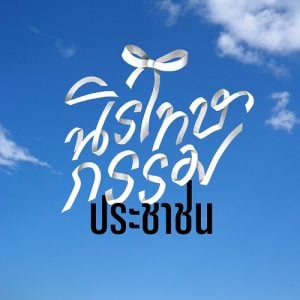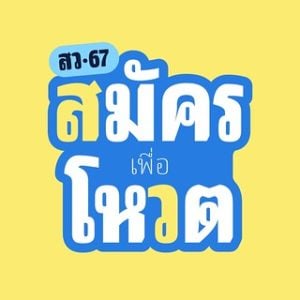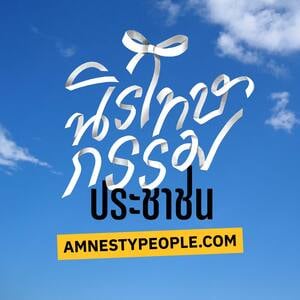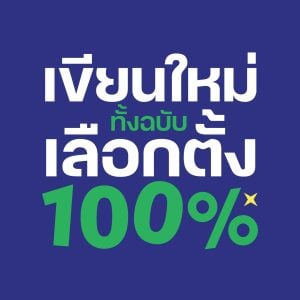This article is translated by Ann Norman.
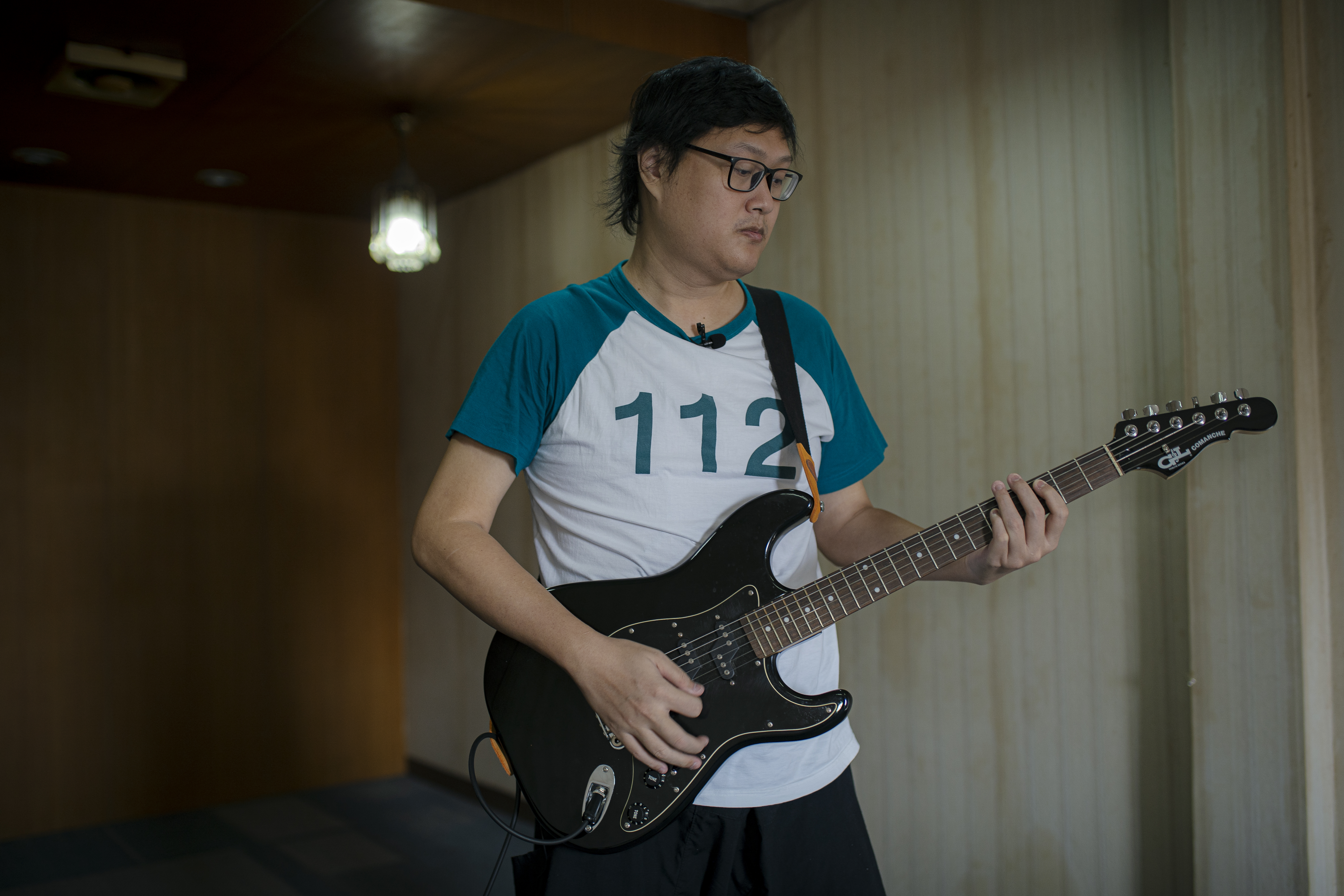
Parinya Cheewinkulpathom or “Port,” singer, musician, member of Faiyen band, is one of the Lèse-majesté prisoners whose cases proceeded after the Ratsadon movement in 2020. Important periods in the life of Port were turned around and upside down during three past summers. The first summer was the life of a youth fascinated with the album Summer by Paradox. And this summer was very influential in his songwriting. The next summer was the bloodshed of April 2010; his anger over it pushed him to begin writing political songs.
During the third summer, the word “rahok-rahern” [meaning to rove around under hazardous conditions] might be a good one to represent Port’s life. His friends and fellow Faiyen band members in Laos were in the middle of a situation where one person after another who they knew were being kidnapped and disappeared, with death threats to themselves, until finally Port himself had to return to Thailand to treat symptoms of pancreatitis. But when he was able get through all that up to the third summer, he was charged with Lèse-majesté and had detained during investigation by police for over two months.
“Maybe it’s not fun. I’m not a fun storyteller,” Port said before beginning to tell the story of his life up to that point.
Student in the Class of ’90
As a child Port grew up with a stream of Japanese culture, consuming cartoons, both by watching TV and reading. Doraemon is the first cartoon [comic book] he read, and it helped Port develop his language better than schoolbooks for the earliest grades like “Mana Manee.” “I was able to learn more difficult words from reading cartoons. Reading cartoons was easy and fun. And if I didn’t understand some words, I could go ask my father and mother, ‘How do you say this?’”
Another scene he remembers is playing games at the arcade. The people who play games have many roles. If they have money, they can own their own game console and games. But if those games are too expensive, and their snack money is not enough, they must accept the role of watching their friends play instead. The price of new games was kind of expensive maybe running up to 30 baht an hour. In that era, a plate of food was about 30 baht. Compared with the price of games, it is very expensive. At that time, he played seriously and saved his money to buy a Playstation to play at home.
“I was addicted to games. At that time, a really popular game was RagNarok Counter-Strike. I didn’t play those games, I played PangYa. It was a golf game that was easy to play. I didn’t specialize in Final Fantasy type games. I played easy games, like Mario or sword-type games. I played for nearly 10 years . . .”
Card games or Yuki cards were something that the kids of that era all liked to play. Port liked to play the card game Magic the Gathering. And playing games was the starting point for his questioning of rules not to do something, rules made by the teacher, the person with power in the school.
“My name Rishadan Port [a screen name] comes from this game [Magic the Gathering]. The teacher viewed it as some sort of gambling. But actually, it was just something the kids bought in to play together. The teacher came out with a rule that if she came across a card game, she would confiscate it. I couldn’t go along with that. I viewed [the card games] as personal property, and I also noticed that school rules weren’t written down ahead of time. I had the duty to debate and explain . . . If I had given in, my group wouldn’t be playing [card games] anymore. It’s exactly like [with] my country here. Whenever I don’t agree with the people in power, I must stand up and fight in [the arena of] arguments and reason.”
“I had issues with teachers ever since I was a child. Most children, if they didn’t agree, they would keep it to themselves. But I spoke up and my parent were called in. Teachers are like people with power. They act in accordance with other authorities that the government sets up. They teach like this so the children will be like this. For instance, the ritual of Teacher’s Day, I never agreed with it. What is it for? What meritorious thing have they done for us? They take the money that we pay for the school term. I didn’t come study for free. And even when we do study for free, it comes from the state, meaning our taxes. Why must they have merit [earned for doing a good deed]? Why do we also have to bow down to them?”
A Meaningful Summer for a Song Person
For Port, the starting point for making songs and playing music was listening to songs, starting with the style of music that is easy to listen to, like pop, which he had begun listening to from the period of late elementary school up through junior high school. When he was in twelfth grade, he had the opportunity to see his first concert. It can be said that after that he was a regular and had to go see [concerts] each week.
“Before twelfth grade, the rule at our house was we weren’t allowed to return late.I got the opportunity to see concerts in the twelfth grade. After that, I went to see concerts each week. I liked rock, alternative rock, indie rock; I also liked pop rock. I like almost every type of rock. Metal, I also listened to some, but maybe not as much as rock. Most people probably think metal and rock are the same: “hard.” But they have somewhat important differences.”
Port said that in that period the songwriting of these groups and was somewhat more “open” and had a way that was more exotic than other songs. For example, the use of words over and over in a song, and using the same set of chords, going round and round, for the whole song and allows the listener to imagine their own meaning for the song. The band Paradox was an inspiration, greatly influencing Port in his song work and was also the band he liked the most. He first knew Paradox from the album Intro 2000 [a compilation album with a Paradox song on it], and their album Summer was the one that influenced his song work the most.
“Can you believe it, when they were popular with their first album, I didn’t know them, but I came to know them afterward. I liked the album Summer so much. It was an album that had a ton of influence for my making of songs. After that I went back and listened to songs during its underground period. It made me see that I could write songs like this. I did not need to write mainstream songs. I felt that they opened many ideas for me regarding creating songs.”
Most people know Port as a Faiyen band member who does political songs. But in his past, as a music lover who dreamed of having a band, Port had experience setting up, disbanding, and combining music groups. He was affiliated with at least five bands: Us, LS20, Fuxk Fake Force, Risky Drop, and Tubtim Siam, with the first four, which he did with his friends, not having a lot of political content.
“I had a band ever since my second year in college. In 2003, I established a first band with friends called “Us”. At that time, I thought I would use the name “POW”, which comes from the first letter of everyone’s nickname. But my friends did not agree to it. Us was the band of ours with a catchy name. I liked “Us” more than “We” because it was a passive form.” In his view, being the passive one who had been abused, can be an inspiration to do something.
“After that, I had another band “LS20”. This one was a band of friends from high school days. But we missed each other and so came together to form a band. It existed briefly and then the drummer got very busy with his work such that we couldn’t practice together. This caused the bassist of “LS20” to come join with “Us”. After this the old bassist of Us got more involved with his studies and quit. So I invited the bassist for “LS20” and “Us” band to come be the band “Risky Drop”, giving it that name in the year 2020.”
“Risky Drop” is the most recent of his bands. The content of the songs is sociopolitical sometimes, but without aiming directly at the institution of the monarchy. There are songs about the lives of ordinary people, like “ตื่นสาย” (“Wake up late”). Port explains that for this song, everyone in the band helped write it. Its starting point is a poem the drummer wrote from his own life. The reason someone wakes up late is because he doesn’t want to go to work; he doesn’t want to meet some woman because she is a mean person. Everyone helped expand on that. Port himself doesn’t like working early. And so in the end, this song came together.
“Back when I was working, I was someone who would work late. I didn’t like starting work really early. I couldn’t wake up. If someone asked, ‘Is the work done?’ it was. I thought, if the work’s done, that’s enough. Wouldn’t you agree? I don’t see that it’s necessary to come in at any particular time or leave at any particular time. I could also work at home. Why would I need to come into the office? I can do it anywhere as long as it’s done by the deadline. By my way of thinking, it’s not necessary to come in to work. I once got to the point of asking the boss if I could work from home, and then no raise would be necessary.”
Bloodshed in the Summer Pushes into the Road of the Political Musician
The movement of the People’s Alliance for Democracy (PAD or Yellow Shirts) in the year 2005 was a starting point for Port becoming more interested in politics. Port was just one more person opposing the administration of Thaksin Shinawatra. But the important breaking point was when the Queen Sirikit attended the cremation ceremony of Ankhana “Bow” Radappanyawuth, a woman who died during the crackdown on the rallies of October 2006. This caused him to become interested in learning more political history. Port went on the web board “Fah Diow Gan”[Same sky] and came across information that he had not heard before. His first reaction was to not believe this new set of facts right away because he himself had previously gone through the pacifying education of the Thai state.
“I used to be like an ordinary person, thinking you shouldn’t touch the institution of the monarchy. It is way up high, therefore if you don’t like it, you should keep it to yourself. I tried to find reasons to counter [the information on Fah Diow Gan]. Even if I was starting to dislike the PAD, I still had a belief like Thai people are loyal [to the monarchy]. After I read, I had information of another side. There were many sorts of things I still didn’t believe, but if you go looking for proof there is always proof. Looking for news on the news page or in the newspaper, there are pictures or incidents of the institution of the monarchy being involved in politics.”
Later on in April 2010, there was the crackdown on the Red Shirt gathering in the area of Khok Wua intersection. On that occasion, there were 26 people killed altogether, 5 soldiers and 21 citizens. It was the starting point of his dissatisfaction. And it made him begin to write and come out with songs that were political.
“I saw they were harmed and it wasn’t fair. It was then, I began to be not OK [with things]. I began to write and release political songs. Honestly, before this moment, I would only write that something was not really good. The first songs where I began to feel I’ll just get it off my chest, speaking directly, was the song กูไม่รักมึง, (Goo Mai Rak Meung) “I Don’t Love You.” I wrote it in the midst of the pain and anger of the events of 2010. At that time, there was a project to do songs. I had “I Don’t Love You” and the song “112.” I thought I wanted to do two songs together that would communicate more clearly. But in the end the project fell apart. I didn’t do it.”
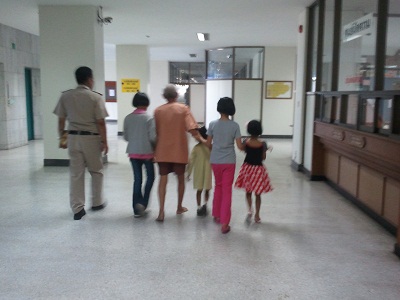
Further into the year 2011, Ampol Tangnoppakul or “Uncle SMS” was accused of sending 4 text messages to Abhisit Vejjajiva’s secretary insulting the king and queen. And the next year the criminal court decided that Ampol would be sentenced to 20 years. While in prison, he died of cancer. This case received much attention because of the long sentence. The accused was an old man, living in poverty, who denied that he had sent messages, saying he didn’t know how to send SMS messages. The stream of news and talk from the case of Ampol caused Port to think to himself that he must begin to use music to move society in a certain direction.
“I joined in with band Tubtim Siam. At that time, the members of the band Tubtim Siam were Khun Boat, who was my boss. He invited me to become active in a movement, and I was interested. It was certainly true that a driving force for the movement was the case of Uncle SMS at the end of 2011. It made us feel we wanted to do more than just this.”
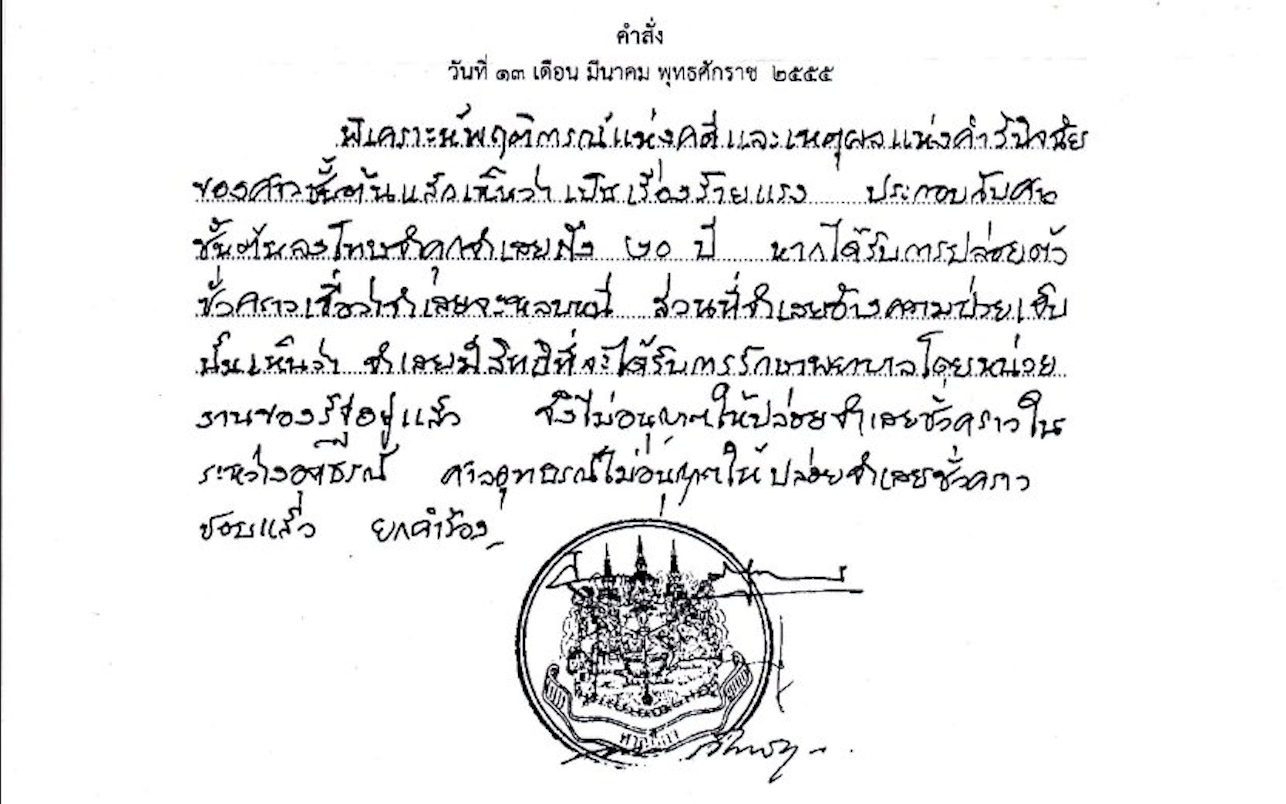
From 18 January 2011, the day Ampol’s case started, to 3 April 2012, the Court of the first Instance dismissed bail requests for 4 times, the Court of Appeal dismissed 3 times and the Supreme Court dismissed once.On April 3, 2012 The defendant’s Lawyer withdrew an appeal and a month later Ampol died of liver cancer. : Read the case.
While Port was playing music with Tubtim Siam, he got to know the members of Faiyen band, who would come play backup for Tubtim Siam, and they would talk and chat about every issue together, so later on when one of the members of Faiyen band left, it opened a way for Port to become a member of Faiyen.
Over the past 37 years of Port’s life, the first half has been full of comic books, gaming, and music. He didn’t have space for serious politics. But in the next half, as he travelled down his road of politics, his interest in other matters was significantly diluted.
“Before that point, I wasn’t interested in politics. I was interested in music, gaming, and comics. I noticed that I was playing games and reading comics a little less. At this point I hardly read at all.
The Coup, Fleeing the Country, and Disappearances
The content of Faiyen songs is sarcastic commentary on politics, and relative to the many points implanted in us in school, “higher ceiling” than the communications that came out in the same period, whether it was the matter of the crackdown on the gatherings in 2010, the cases of Article 112 [Lèse-majesté], or calls for releasing the political prisoners. Some songs like “If You Don’t Love [Them], Watch Out, You’ll Go to Jail” are songs that you still hear often in the movement and rallies of the Ratsadon Group of 2020.
Right after they first debuted in 2011, Faiyen used music to further the movement, putting it out there to create change. But history circled round again on May 22, 2014. The National Council for Peace and Order (the NCPO) staged a coup and grabbed power from the government of Yingluck Shinawatra. Two days later, NCPO came out with NCPO Order 5/2557, calling for persons to report themselves to the junta, with names of academics and political activists on the list, including members of Faiyen band, particularly Jom-Nithiwat Wannasari), Khuntong-Trairong Sinseubpol, and Yonok-Charit Yonnakphan.
Even if the summons that time didn’t have the name of Port, an order like this makes other members of the band feel unsafe and therefore flee to Laos. As for Port, he decided to follow them as well.
“When the coup happened, I felt that I still wanted to be making songs with the band. The officials likely didn’t know me yet, and I hadn’t ever made my name public, so people also didn’t know. They had a summons for every person, but one person was funny. The officials knew his wrong name and they issued a summons list using this wrong name, summoning the wrong person. They probably used a certain website that had the biographical information written out incorrectly. It was pretty funny. However, we could see the officials doing the summoning obviously intended to call in Faiyen.”
While taking refuge on the other side of the Mekong River, friends in the band still produced songs and streaming programs with content opposing the military dictatorship in Thailand and neighboring countries. Meanwhile, in Thailand “BNK48”, a female musical group, became popular, and Port was one of the people who followed that band. “I used to do a show (‘Songs for Commoners’) with Siam Theerawut who disappeared while a refugee in Laos in May of 2019. There was talk about BNK48 all the time. There were fans of our show who liked to talk about their idols and wanted us to talk about these idols. This meant we had to go find information about the various idols in the group, for instance SWEAT16 and Fever.”
Port has a slightly different status than the others. As he had never been on the list of people summoned, he always entered Laos legally, and was able to continually travel there and come home to Thailand. Passing inspection at the border was no problem for him.
On July 30, 2016, around the time of the Constitutional Referendum campaign, he went to sing songs and sell CDs of songs at the October 14th monument. Afterwards, police approached to investigate and informed him that the CDs he was selling were not properly licensed, and they took him to Chana Songkhram Police Station. They checked his history and learned his real name. At that time he realized he was now much less safe. So he decided to cross to Laos, hoping to go permanently. “In the first period, I could come and go. But after this incident, I decided not to come back. Because there was a huge chance that I wouldn’t be able to save myself, so I didn’t come back. At that time, I didn’t think, ‘I won’t be able to come back here anymore.”
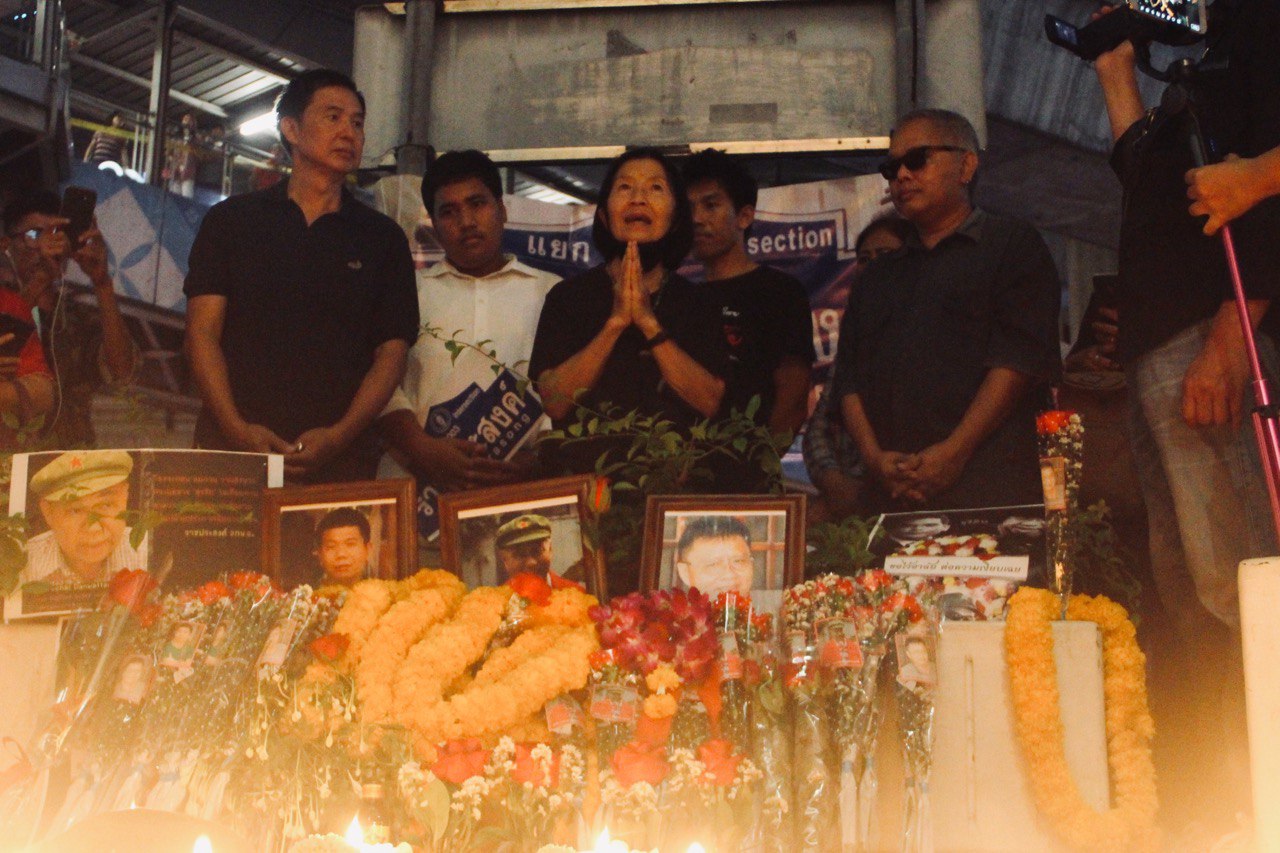
In that period, the situation of the refugees in Laos was starting to go badly. On June 22, 2016, Beer-Itipol Sukpaen, aka DJ Zunho, disappeared mysteriously. DJ Zunho was a Red Shirt from Chiang Mai and was doing a program that criticized the king directly. After that, more refugees in Laos disappeared every year, specifically:
- July 29, 2017, Wuthipong Kachathamakul, aka Ko-Tee
- December 12, 2018, Surachai Danwatananusorn; Kraidet Leulert, aka Gasalong; and Chatchan Bhupawal, aka Puchana
- May 9, 2019, Chucheep Chewasut, aka Uncle Sanam Luang; Kritsana Thapthai; and Siam Teerawut
Port said that the first incident of kidnapping and disappearance, acted as a wake-up call to the refugees, and people moved to new living spaces for safety. With each move, the refugees like him were forced to abandon nonessential items, knowing they could buy new ones, “We took only things that were necessary. As for me, what I always kept with me was my guitar and Laptop Computer. Some of my clothes I had to abandon.”
Among the political refugees, there was no one who believed in their heart that they would live in Laos forever. Those people tried to go apply for refugee status to travel to a third country many times and to many places, but they were refused. Meanwhile the refugees began to steadily disappear.
From DJ Zunho to Uncle Sanam Luang.
From 1 to 2 . . . to 8.
Six disappeared; two corpses were found which had been horribly mutilated
Next in Line: Faiyen. They Must Stop or Die!
On May 19, 2019, there was news of an effort to wipe out Faiyen, “There was a sound clip of someone threatening, if we didn’t stop our activism, he couldn’t guarantee our safety. They had the coordinates of our locations and were able to tell us where the members of Faiyen band lived. But the members of the band did not consider stopping.”
After this news was publicized using hashtags #SaveFaiyen and #อย่าฆ่าไฟเย็น (#Don’tKillFaiyen) to send out the cry that there shouldn’t be any wiping out of refugees, where they just disappear quietly. This led to an opportunity for the members of the Faiyen band to flee to France. During this stressful period, Port continually shared the views and perspectives of the people in Laos via Twitter. This caused many people to think Port was in Laos and fled with his friends in Faiyen band to France, but that wasn’t the case.
In the year 2018, Port began to have symptoms of an illness. The starting point was one day he woke up with severe abdominal pain. It was not so bad that he could not eat [an over-the-counter remedy for indigestion]. But anyway, his symptoms did not improve and he had to go see the doctor. The doctor said the symptoms were severe, but he could not diagnose it. It was totally clear that the doctor was not capable of diagnosing the illness.
“I thought that I would die, at that time. The doctors in Laos told me frankly that I needed to decide: Here, there are only two choices: I could continue to be treated in Laos, where they would do everything they were able to do, to the extent technology would allow, or I would return to Thailand where the medical technology was better. It wasn’t hard to decide, that’s for sure. I didn’t want to die. And so I had to return to Thailand. Even though I was returning to Thailand and risking arrest and jail, I still wouldn’t die. But if I stayed in Laos, I might be in danger of being abducted.”
In December 2018, after he had returned for treatment in Thailand, the doctor diagnosed Port’s illness as pancreatitis, seriously acute at its first appearance. “I can remember it was around Christmas that I came back for treatment for 10 days. So I came out of the first hospital, and went for further treatment at another hospital. Before one month was over I was admitted for another month.”
Pancreatitis has causes like alcohol and gallstones. The doctor said, that in his case it was definitely a matter of alcohol even though Port drinks very little. His own guess is that maybe it was because he wasn’t a heavy drinker at first. He only began drinking alcohol when he was 30 years old, when he went to Laos, so his body was unaccustomed to it. He recovered gradually until the news of an operation to wipe out Faiyen. He still used social media to communicate matters of Faiyen to the public and, for his own safety, he acted as if he were still in Laos.
“At that time, I was near death already. I thought that if they came and killed me here [in Thailand], I’d be dead and they wouldn’t need to go kill my friends. At that time, my symptoms were really severe and I didn’t want to live that much. I have to admit that, at that time, I was kind of depressed. I wanted to die, because it was really torture. I felt that prison would involve much less pain.”
Port is a large person. Before he fled, his weight was about 103 kilograms [227 pounds]. When he went to Laos, he lost weight continually till he was 80 kilograms [176 pounds]. And when he became sick, his weight dropped to 50 kilograms [110 pounds].
“I didn’t have strength to walk. I didn’t have even enough strength to open a bottle of water. I didn’t have strength to turn over. This disease collapsed my digestive system. I was sick of food at that time. If I ate, I would throw up. It became, go pull every old thing out of my body to use until there’s nothing left. Then I thought, if I continue to eat, I’ll just keep throwing it up, so I’m going to die for sure. But luckily, a point arrived where I stopped throwing up. My digestion started to improve. I started to be able to eat without throwing up.”
It took more than 3 years, approximately, for his body to recover back to the weight of about 80 kilos. Traces of his emaciation still show along the body. On the inside of his arms, he have a pattern of lines and furrows—marks that say he was once heavier than this.
Ratsadon 2020 and Reforming the Institution of the Monarchy
After the year 2014, under the total power of the junta, people campaigning for democracy had almost no room to wiggle. Large numbers had to report themselves according to the summons of the NCPO and had to sign that they wouldn’t do any political activism. The government of NCPO had a tendency to use harsh legal cases like Articles 112 and 116 of the Criminal Code [Lèse-majesté and sedition] in suppressing and controlling political dissidents, to the point that it was almost impossible for assembly to take place at all. Port’s decision to try to recover from his illness in Thailand had the silver lining that he was able to see a scenario that he never thought or dreamed would actually happen: the rallies calling for reform of the institutions of monarchy of the “Ratsadon” in the year 2020.
The fact that Port wasn’t doing well physically, made him unable to join the rallies, but he followed the news constantly.
“I wouldn’t have been able to run when the rallies were dispersed by state officials. My physical condition wasn’t good enough. But I supported the protests on Twitter and Facebook. I supported them always. I agreed with the movement. I agreed with every matter relating to the institution of the monarchy. As for other matters, I liked them too, but I just looked to the point. I liked the speeches of Arnon Nampa the most. Certainly there were some points where maybe I disagreed, even to the attitude he took in the speeches, but I understand why he spoke that way.”
Port said, the Ratsadon movement made it so discussion of reforming the monarchy became much more widespread in the period after 2020. One of the 10 proposals for reforming the monarchy was repealing the Article 112 of the Criminal Code [the Lèse-majesté law]. Ever since the case of Uncle SMS, Port carried a conviction that Article 112 was much too severe and he always stood on the side of those of those calling for repeal of Article 112.
“My goal was the repeal of Article 112. I didn’t agree with amend it. I didn’t put my name on the petition to amend 112 . . . When the Ratsadon tried to repeal Article 112, I quickly put my name on it. If it is a matter of repeal, I fully support it. I am very happy that the movement of the young people has progressed so much. But the presenters are politicians. I think they have yet to catch up to citizens.”
He sees that the repealing of Article 112 and proposals for reforming the monarchy are bold campaigns of the 2020 Ratsadon. But anyhow, he believes that the criticizing of the institution of monarchy has no ways to bringing down the monarchy.
“There is no overthrowing the monarchy. The monarchy can’t be overthrown. There is no one with collected potential force sufficient to overthrow the monarchy. This is the truth. What will you take to go overthrow the monarchy? The most you can do is just criticize. Speaking is something you should be able to do freely. I never ever thought that the institution of monarchy would just slowly crumble due to some critical thing I said about it.”
“As for adjustment/change, in my view, it would be beneficial for the monarchy, as so many other people also think. The royalist side, which come out cheering the royals, right now probably don’t agree. But certainly, the thing I must struggle to do is use reason within arguments so people understand that, actually, this matter is a good thing, in the long term, for society and the monarchy as an institution. Even if they don’t agree, if we still keep speaking continually, they’ll have the opportunity to change their minds accordingly.”
“Even though it is something that goes against the mainstream of society, and society doesn’t agree, I *expletive* don’t see it their way. And so I post. Because in my view, I see it exactly like this! I think, this is correct for me. But, for sure, correctness or virtue [and] evil, it changes with the eras. Consequently, in one era where we think ‘this is good’; if I think ‘this is wrong,’ I’ll express myself. I’ll keep on expressing my opinion. If this era doesn’t accept it, in the future maybe they will. Maybe I’ll be dead by then, but OK.”
112 Arrest Warrant and First Time in Jail in the Summer
March 5, 2021, while the political activists where gradually being locked up in jail, while the cases were being considered, the police arrested Port at his home following a military court arrest warrant and showed a search warrant of the Pra Kahnong Criminal Court to seize his phone and Laptop computer. Port was accused of insulting the king, under Article 112 of the Criminal Code, after posting on Facebook three messages during the months April to July 2016. For this case, the military court had already come out with the arrest warrant in August of 2016, when he was arrested by the Chana Songkhram Police Station for selling CDs without having a label.
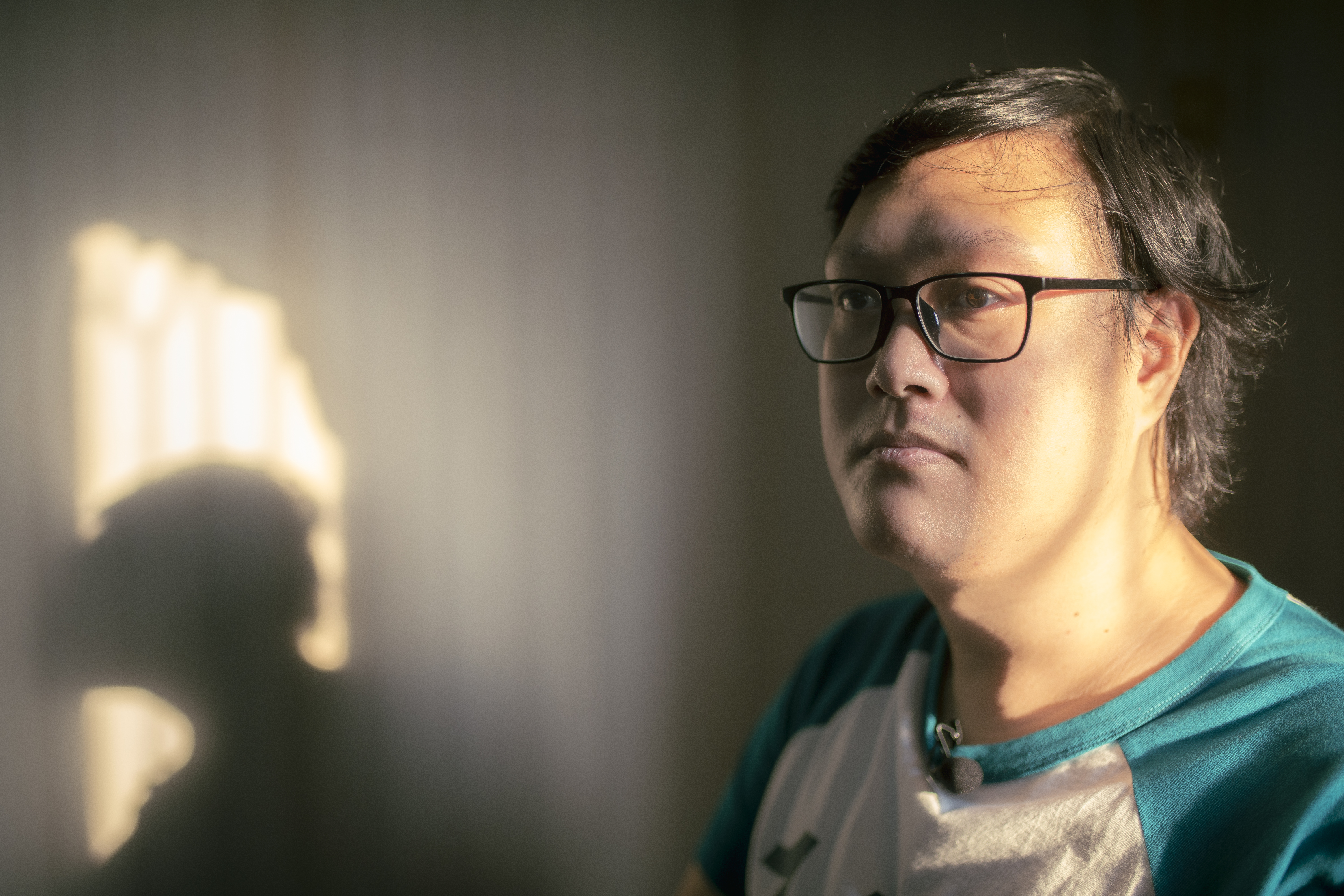
The very next day, the court came out with an order not to allow bail. This meant he must be in jail during trial and that he had the opportunity to meet with the Ratsadon in jail, and this was the third summer that really had a huge impact on him and his ideology. Port already had gotten past nearly dying from pancreatitis. The difficulties in jail were, therefore, just the beginning of another new experience.
“It was a new experience. At first, I went to stay in the covid quarantine area for 14 days. Previsously, the jail would have an area for admitting new prisoners, it was Area 1. But now, new prisoners had to stay in the quarantine area first and then be divided into other areas. I was sent to Area 6, which had Khun Somyot Prueksakasamesuk. But at that time, I didn’t get to meet Khun Somyot at all because Khun Somyot had to go to appear in court, and when he came back, he had to be in the covid quarantine area for another 14 days. The fact that he left the court often, made it so there was no opportunity for him to come into Area 6 where he had been assigned. But when I went to see the lawyer, I was able to meet Somyot, Penguin-Parit Chiwarak and Arnon Nampa”
“I was sort of more chill than my friends in the room. Some were panicked and some let out their feelings. I can understand. As for me, more neutrally, I tried to view it as how are we going to be living? When we were at the first receiving area, it was kind of comfortable. But we had to stay in our rooms nearly 24 hours a day. We could come down [from our cell rooms] some. When we came to stay in Area 6, supervisors would have us come down from the room where we slept at 6:00am. We’d walk around, sometimes meet friends from other rooms, could have some interactions with people in the area.”
Port reveals that after they were they were sorted into Area 6, the prison allowed him to play sports. But he’s not the type of person who likes exercising, “Even if I were well, I still don’t play those sports.” When he was in the prison, there was an organization aiding the political prisoners, always sending food into them. They get a lot of food and so share it out with fellow prisoners. I believe it is a way to create friends within the prison. I am the kind of person who doesn’t expect or hope for anything, and I had already assessed my future using the worst-case scenario, and so I didn’t expect to come out quickly at all.”
“I thought, they are going to have me stay a long time and fight the case in jail. At that time, I said to my friends in jail that I was just stuck there for 45 years because my case is 3 counts of article 112. One count is 3 to 15 years, and they will go with the maximum. That’s how I talked and laughed about it. I had already used the worst-case scenario to assess that the odds were I would meet with the worst *expletive* thing. If I didn’t meet with that thing, I would meet with something better, which would be good.”
While in the prison, letters came to Port and fellow prisoners continuously. Port grabbed the pile of letters laid one top of each other on the table. When asked how he felt about the letters from people on the outside, he answered with a smile, “If I had some, it was good.” He read the letters, each one, and divide out the ones written to him from close friends; the rest he donated to Museum of Popular History for preservation. “If you meet Mor Lam Bank [another activist], Could you give it to him? The officer mixed his letters in with mine.” He asked to pass on the mail of Mor Lam Bank who was imprisoned at the same time.
Many tens of letters were written, and they were firm and determined. Most offered moral support and some were his work with Faiyen band.
Examples of Letters to Port
“I never used to know you that well. But once I started to follow your work, I was amazed. I thought that you were very talented and very brave. I knew of your work first from the song ‘Hanging Tree.’ You did that very well. It was like, ‘This song was composed for events in Thailand, the October massacre!’ Very appropriate. After that I knew of your song “Paw” many other songs as well. When I learned that you’re sick, I was shocked. And yet they still came and arrested you! I’d like to send you moral support/strength of spirit! I will join the activists protesting outside so prodemocracy fighters receive their freedom. As you said [in the song “Paw], ‘If they forbid thinking, forbid asking, forbid criticizing, then how can we know if it is actually good?”
“I like the songs of Faiyen very much!”
“Hello Khun Port. I hope you are doing well. I heard the song catalogue of you and your friends. It’s a good body of work and delightful/entertaining. May you always have strength of body and soul. May you have good health and freedom in the near future.”
“I have followed you, Brother Port, from Tubtim Siam to when you joined Faiyen. I know that you, brother, are someone bold in speaking of matters that many, many people don’t speak of. The movement of you and the other refugees is a thing that shakes the system of feudalism which is about to collapse in not too long a time. Even though today, you, brother, have lost your freedom, the songs you composed inspire the hearts of people to rise up and fight against the bureaucracy.”
On May 12, 2021, while he was sick with covid in prison, the criminal court arranged an order for temporary release that afternoon. It specified bail of 200,000 baht with conditions that he is forbidden do anything that in any way would cause damage to the institution of monarchy; that he is forbidden from traveling outside the country without permission; and that the accused must come to court for every scheduled appointment.
The conditions of his temporary release have not made Port’s life all that difficult. There is an uncomfortable cramped feeling that he must carefully consider his posts. Previously, even though the court forbid him to post on the basis that it would create disgrace for the institution of monarchy, he still posts regarding individual points in the call to reform the monarchy as in “The 10 Demands to Reform the Monarchy”. And he believes that the content of his posts does not create any disgrace. “These reforms are good for the monarchy in the long run. The things that we propose would be a good outcome for the monarchy and don’t do anything to disgrace it.”
Books and Songs: Hobbies within Prison
No different from other political prisoners, he used his time in prison reading books. Port says that, when he was in prison he read a book about gender, by Thanet Wongyanawa. When he received his freedom, he therefore brought and read many other books, and even right now he’s just finished two books. But that’s with him still not working at a regular job because he is still stuck with the legal case. He therefore has time to “keep harvesting.”
“I had the opportunity to read [Thanet’s book] in jail and feel that they’ve been studying thoroughly since former ages. The way they describe it is enjoyable. Some books are hard but not too hard. Right now I’m reading “ว่าด้วยเรื่องความสุข” [“On Happiness”]. It’s really fun that in past ages we people saw happiness one way, and in this age we see it another way. And there are different political matters. Actually, I’m interested in the matter of belief(s), ideas, ideology. I’ve long been interested in the matter of religion. Previously I believed in God. I believed in life after death. But later, I didn’t believe. I saw that it was a matter that can’t be proved. I saw that the thing that can be proved is this world. This world we live in and can see for real. And why must we seriously desire the things it will have or not?”
Another thing that Port did was compose songs during the 68 days that he was in jail. He was able to compose 3 songs. One of those was a song titled, “สมเด็จ” [Somdet is an honorary title by birth or appointment and it is also the title of Thai Royal Family]. For people who had not been in jail before when you hear the title of the song, you might over think it. But it’s not like that.
“It was an idea of mine when I was in prison. They called it ‘being a VIP prisoner.’ They had money and were able to buy comfort and convenience. The people in there with them would call these people, ‘Somdet’ like they were high class in prison. It was a sarcastic way of saying that someone was at the level of ‘Somdet,’ like, ‘Oh those Somdet!’”
“And so I thought, it’s interesting . . . because they were a reflection of class structure. In the hook, it says ‘How come they say people are equal/ Even in prison there are classes/ There is no justice.”
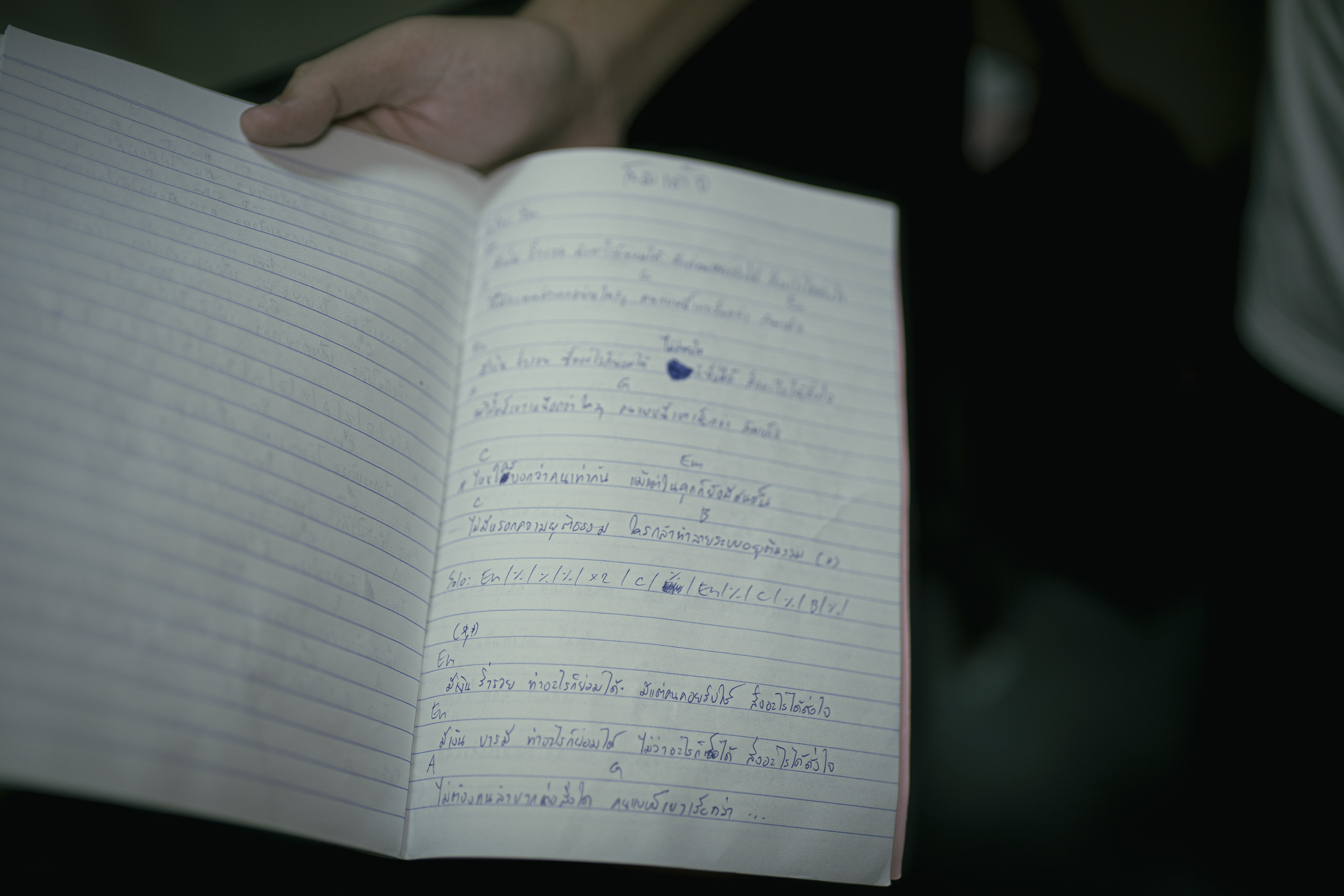
He related that among friends that he met in jail, many of them also composed songs. Most were love songs. There was one person who had been a prisoner so long he had written 100 songs.
“There were some people in jail who composed lots of songs. I know one person who began writing songs in jail as a novice but had composed 100 songs because he had been there so many years. He composed continually. He could compose in many styles, but they were mostly old styles from the late 1930s to the early 1950s, and luk tung (Thai country). He was stuck on former styles that had a “glon-8” rhyming pattern. There were rhymes between the parts too. I said ‘What if you don’t worry about rhyming, would that be good? Would it be good to worry about these other issues that I’ll tell you about? I shared the songs I composed with him, and he got some ideas from me. It was fun.”
“Some people composed in a very current style. They were about twenty-something years old. They compose pretty good songs. There is also song-work within the prison. Inside the prison there is a project “To Be Number 1.” There is a room for making songs. But you must make songs that can be played in the prison, emphasizing encouragement/keeping up the spirits of the people in jail.
Countdown to the 112 Case
From March to June 2022, the criminal court examined the witnesses and defendants and set to render the verdict on August 15, 2022.
On the first day of witness examination, his father and mother also joined with those listening to the trial. Port and his mother arrived together first, in order to be there on time, as the criminal court is far from their home in the area of Udom Suk. Port’s mother is Thai of Chinese descent. The small-sized women listened intently to the proceedings with no sign of agitation that she must sit in a court room where her son is a defendant. And after the trial began, his father arrived and joined them.
Port said that his father and mother wanted to come watch the proceedings in the case, just like fathers and mothers anywhere are concerned for their children. He said that at home they had never agreed with his going out to participate in a political movement. And they were concerned, not wanting him to end up charged with something.
“But there was no one who could stop me. There was no one who could forbid me. Consequently, I arrive at this point. They were just worried for me. Agreeing or not agreeing is one thing. As with other things that people in our family do, if I don’t agree, maybe I will advise them, but if they do it, that’s on them. It’s the right of each individual person. At home, we respect the decisions of people in the house. It’s kind of like that. My mother and father are like this too, but it is also in their nature to want their child to go in the path they need them go. Although they think it is good for me, I might see it differently from them. That’s all it is.”
These days, he still is unable to work due to the ongoing case. So he must live his life at home doing different hobbies. Port views his decision to return to Thailand as correct. It allows him to recover from his illness and meet with his family one more time.




